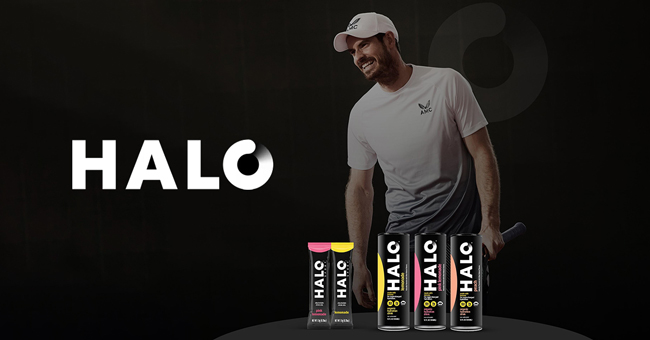
Organic hydration beverage brand HALO announced this week that it has received an investment from tennis star Andy Murray, marking its first partnership with a professional athlete.
In addition to a financial stake in the brand, which sources reported as being in the six-figure range, Murray will also serve as a brand ambassador. His involvement comes a year after HALO partnered with Grammy-award winning artist Pitbull and members of his dance team “The Most Bad Ones.”
According to co-founder and CEO Anshuman Vohra, Murray’s team reached out to New York-based HALO last year as the three-time Grand Slam champ was seeking out new brand partnerships. Vohra said the agreement is well timed as the company prepares a U.K. expansion (Murray is English) and the launch of several new line extensions this year.
“[Murray is] currently consuming products like HALO to give him this benefit because he’s really into his health,” Vohra said. “He knows that being hydrated is a key to longevity for him, so when he got involved, that was a really important consideration for him as it would be very difficult for him to get involved in a product that he didn’t consume himself.”
In addition to promoting the brand, Vohra said Murray will also help HALO to develop new flavor formulations.
Founded in 2019, HALO produces a premium line of better-for-you sports drinks containing only 10 calories and 2 grams of sugar per 16 oz. bottle. The brand’s portfolio includes Black Cherry, Blood Orange, Lime, Peach, Pineapple and Pink Lemonade varieties. The brand is currently sold online on Amazon and direct-to-consumer and is in retail in the New York metro area with chains such as Circle K and Walgreens.
According to Vohra, HALO expects to launch in the U.K. within the next few months in order to be on store shelves before the 2021 Wimbledon Championships begin at the end of June.
Though the brand has been on the market for over a year, Vohra said the company had to pull back its retail business during the pandemic, closing out its West Coast accounts and limiting its geography. However, he said, the company has thrived online and the marketing strategy has reflected the shift.
As well, HALO ceased distributing through text-to-purchase company Iris Nova at the end of December, with Vohra saying the company chose not to renew its contract in order to focus on building out its own digital marketing and ecommerce platforms.
This month will also see HALO expand its platform with HALO Daily, a new line of anytime hydration beverages packaged in 12 oz. aluminum cans. Available in Peach and Pink Lemonade flavors, the drinks are designed to be consumed throughout the day. The drinks will retail for $2.50 per can. Vohra said the line is rolling out in a test period which will last for roughly a year and will be available via ecommerce and in select specialty retail accounts.
Vohra said the company hopes to build its identity around healthy hydration and is focusing all innovations around that concept, rather than branching into other functional benefits. Adopting a canned format for HALO Daily was a significant step for the company to embrace new sustainability initiatives, he added.
“I think there was a bit of cognitive dissonance in the fact that we want to be a next generation beverage brand, but we’re still in a PET bottle,” Vohra said. “To be truly next generation, somebody had to be the first to come in and say we’re going to put a hydration drink in a can and try to do it at scale. So we thought let’s do that.”
In addition to Daily, HALO is also launching next month a single-serve electrolyte powder line called HALO On The Go. Citing powdered hydration brands such as Liquid I.V. as an influence, Vohra said the company had received feedback from consumers that they were interested in a travel-friendly powdered format. He noted that since the beginning of the COVID-19 pandemic consumers, single serve powder sales have increased and the launch will allow HALO to compete in a fast growing market. The sticks also include immunity boosting ingredients. The line will sell in 12-packs online and in retail.
“If everyone comes out with a powder as just a me too product, I think that is not a good thing for the industry or the consumer, and so for us I’m very, very mindful of making sure we have a point of differentiation,” he said. “We will have meaningfully less sugar than the category leader, we will have lots more vitamin C than the category leader, and our pricing will be at market — it won’t be crazy high, it won’t be crazy low.”